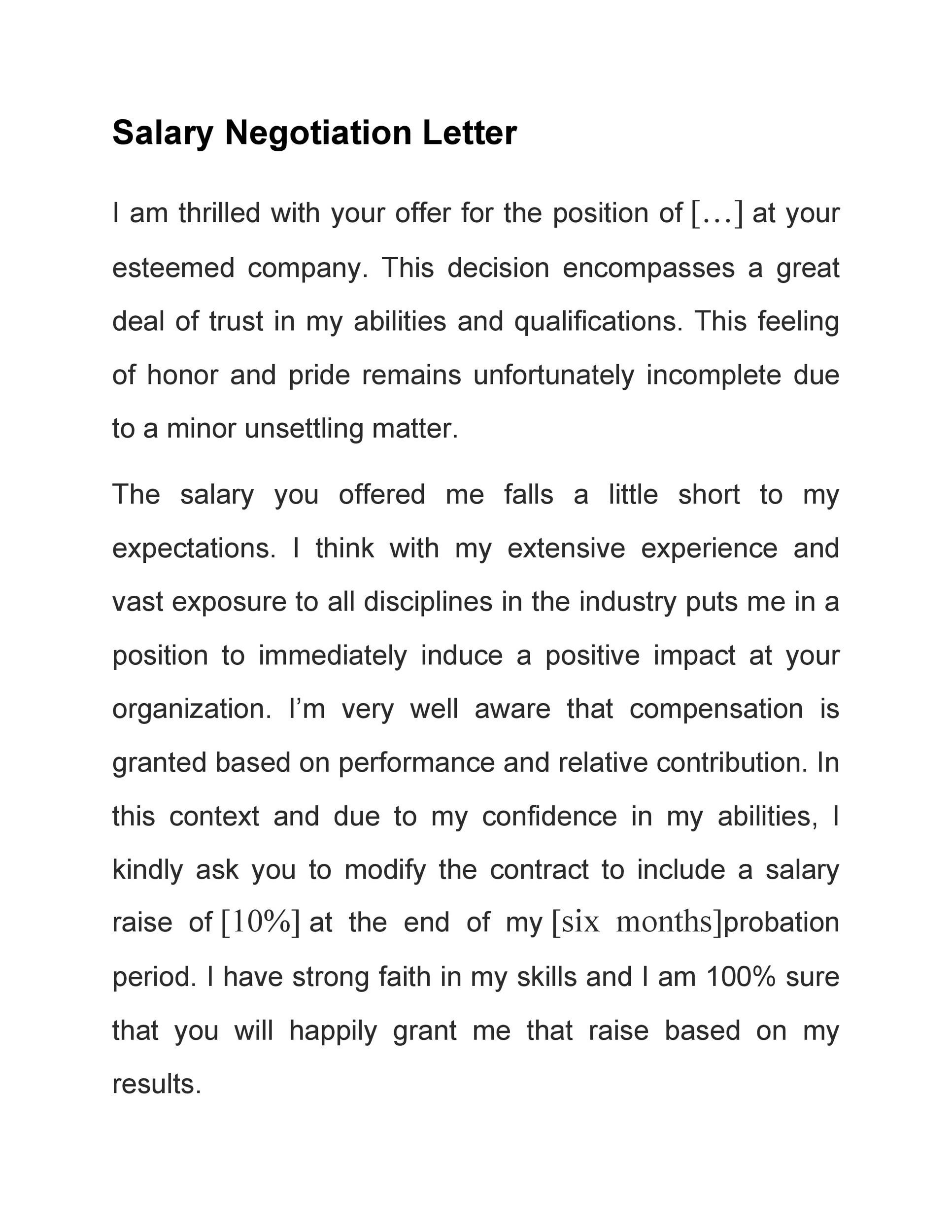Job Offer Negotiation: Handling A 'Best And Final' Offer

Table of Contents
Understanding the "Best and Final Offer" Tactic
The phrase "best and final offer" is a common negotiation tactic used by employers. Understanding their perspective is crucial to crafting your response. Employers use this tactic for several reasons: they want to conclude negotiations efficiently, avoid lengthy back-and-forth discussions, and potentially gauge your true level of interest in the position. From their standpoint, it's a way to streamline the hiring process and finalize the deal.
For the candidate, a "best and final offer" can feel like a pressure point. It might seem like your only chance to secure the position. However, it’s important to remember:
- It's often a negotiation tactic, not always the absolute final offer. While presented as definitive, it's frequently a strategic maneuver to see how far you're willing to compromise.
- Employers want to avoid protracted negotiations. Lengthy discussions can be time-consuming and resource-intensive for the hiring team.
- It can signal their level of interest in the candidate. A "best and final offer" can indicate a strong interest, but it doesn't guarantee it.
Assessing Your "Best and Final Offer"
Before responding, carefully analyze the complete compensation package. This includes:
- Salary: The base annual pay.
- Benefits: Health insurance (premium contributions, deductible, copay), retirement plan (401k match, pension), paid time off (PTO), sick leave, parental leave, etc.
- Bonuses: Performance-based or signing bonuses.
- Stock options: Equity in the company.
Use a compensation calculator to determine the total value of the package, considering all components. Don't just focus on the salary; the complete benefits package is crucial.
- Use a compensation calculator to determine total value. Several online tools can help you calculate the total compensation package, factoring in benefits.
- Review the benefits package thoroughly. Understand the details of health insurance, retirement contributions, and paid time off. Hidden value often lies within the benefits.
- Assess the long-term value, considering future growth opportunities. Consider potential salary increases, promotions, and bonuses over the next few years within the company.
Strategies for Responding to a "Best and Final Offer"
Responding to a "best and final offer" requires a thoughtful and strategic approach. Avoid knee-jerk reactions.
- Buying time: Politely request a short extension (24-48 hours) to thoroughly consider the offer. This gives you time to reflect and formulate a response.
- Counter-offering strategically: Don't try to renegotiate everything. Focus on one or two key areas where you see significant room for improvement, preferably aligning with the company's needs and your added value.
- Highlighting your value: Reiterate your skills and how your contributions will benefit the company. Quantify your past successes whenever possible.
Remember to maintain a professional and polite tone throughout the process:
- Prepare a thoughtful response, not a knee-jerk reaction. Take the time to analyze the offer and formulate a clear response.
- Be polite and professional, even if disappointed. Maintaining a positive relationship is always important.
- Clearly state your concerns and desired adjustments. Be specific and avoid vague requests.
- Focus on quantifiable benefits your contributions bring. Use data to support your requests for increased compensation.
Negotiating Specific Aspects of the Offer
Negotiating a "best and final offer" may involve focusing on specific aspects:
- Salary negotiation tactics: Research industry standards for similar roles and experience levels to support your desired salary.
- Benefits negotiation – focusing on key areas like health insurance or retirement contributions. Highlight the value of enhanced benefits packages.
- Negotiating start date or other terms: If possible, negotiate a more favorable start date or other terms that are important to you.
Knowing When to Walk Away
Sometimes, the "best and final offer" simply isn't acceptable. Knowing when to walk away is crucial:
- Recognizing deal breakers: Identify non-negotiable aspects, such as unacceptable salary, benefits, or working conditions.
- Assessing your alternatives: Consider other job offers or career paths. A less-than-ideal offer shouldn't compromise your long-term career goals.
Remember:
- Walking away isn't a failure; it's protecting your interests. It's better to wait for a better opportunity than to settle for something less than you deserve.
- Weigh the pros and cons carefully before making a decision. Consider the overall impact on your career and personal well-being.
- Your worth is reflected in what you’re willing to accept. Don't undervalue your skills and experience.
Conclusion
Successfully navigating a "best and final offer" requires preparation, strategy, and a clear understanding of your own worth. By carefully assessing the offer, strategically negotiating key aspects, and knowing when to walk away, you can increase your chances of securing a compensation package that reflects your value and sets you up for success. Don't be afraid to negotiate; remember, even a "best and final offer" can sometimes be improved. Mastering the art of "best and final offer" negotiation will significantly improve your job-seeking success. So, arm yourself with the knowledge in this guide and confidently handle your next "best and final offer"!

Featured Posts
-
 Rare Photos Cat Deeleys Twin Sons In Adorable Zara Ski Gear
May 23, 2025
Rare Photos Cat Deeleys Twin Sons In Adorable Zara Ski Gear
May 23, 2025 -
 Dylan Dreyer And The Today Show Examining The Effects Of A Recent Event On Co Worker Relationships
May 23, 2025
Dylan Dreyer And The Today Show Examining The Effects Of A Recent Event On Co Worker Relationships
May 23, 2025 -
 Kevin Pollak To Antagonize Sylvester Stallone In Tulsa Kings Third Season
May 23, 2025
Kevin Pollak To Antagonize Sylvester Stallone In Tulsa Kings Third Season
May 23, 2025 -
 The Hunger Games Prequel Kieran Culkin Cast As Caesar Flickerman
May 23, 2025
The Hunger Games Prequel Kieran Culkin Cast As Caesar Flickerman
May 23, 2025 -
 Is The Last Rodeo Worth Watching A Balanced Review
May 23, 2025
Is The Last Rodeo Worth Watching A Balanced Review
May 23, 2025
Latest Posts
-
 Discover Neal Mc Donoughs Fitness Routine For A Bull Riding Video
May 23, 2025
Discover Neal Mc Donoughs Fitness Routine For A Bull Riding Video
May 23, 2025 -
 Best Memorial Day Appliance Sales 2025 Forbes Approved Deals
May 23, 2025
Best Memorial Day Appliance Sales 2025 Forbes Approved Deals
May 23, 2025 -
 Memorial Day 2025 Publix And Other Florida Store Opening Times
May 23, 2025
Memorial Day 2025 Publix And Other Florida Store Opening Times
May 23, 2025 -
 Interview Neal Mc Donough On The Challenges Of Bull Riding Training
May 23, 2025
Interview Neal Mc Donough On The Challenges Of Bull Riding Training
May 23, 2025 -
 Memorial Day Appliance Sales 2025 Top Picks Vetted By Forbes
May 23, 2025
Memorial Day Appliance Sales 2025 Top Picks Vetted By Forbes
May 23, 2025
